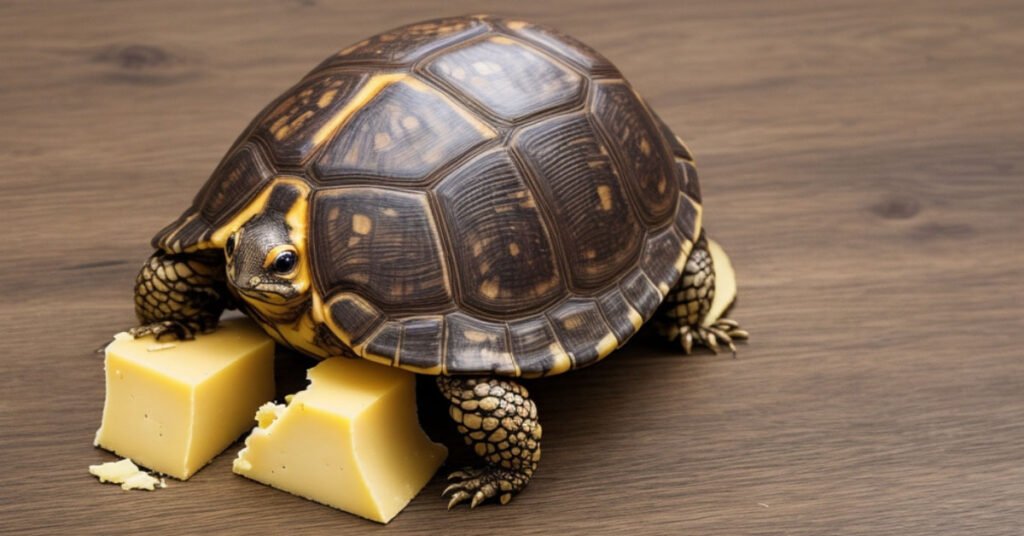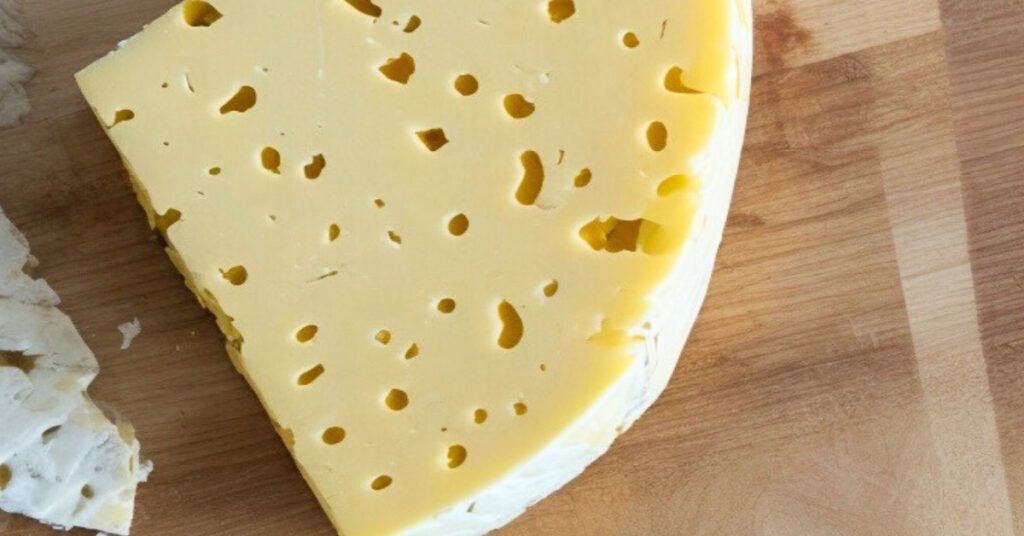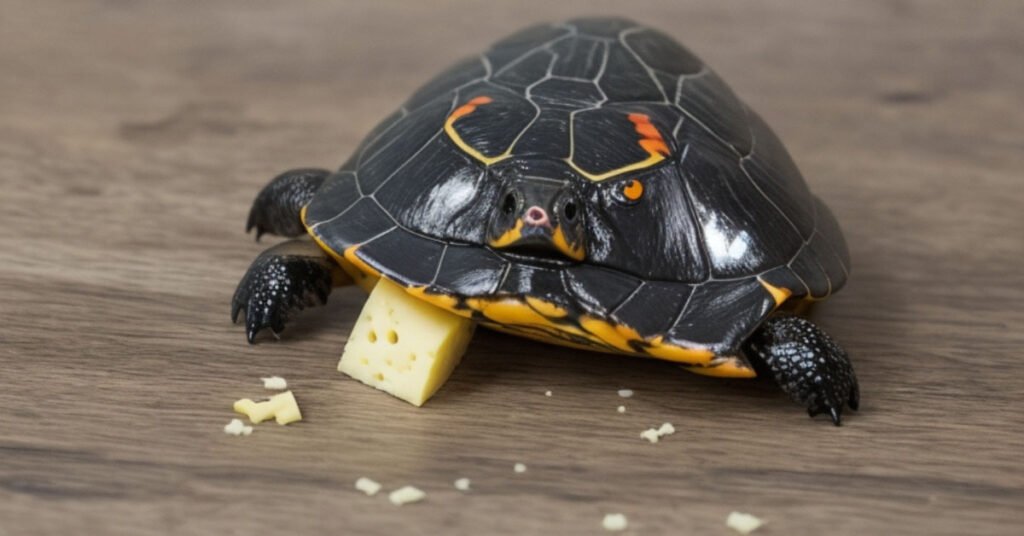Cheese is a very tempting, yummy treat for us. While having this delicious cheesy, you may have wondered sometimes: can turtles eat cheese? The truth is that cheese is a popular dairy treat for humans, but it is not safe for our shelled friends. Turtles are omnivorous, but cheese doesn’t exist in the wild, and their digestive systems can’t handle dairy foods like cheese.
Turtles have specific dietary requirements, mainly a plant and meat diet. In this article, we’ll explore the topic of whether turtles can eat cheese and discuss more details about the cheese diet and why it is not ideal for turtles.
Table of Contents
Can Turtles Eat Cheese?

No, turtles shouldn’t munch on cheese. Dairy stuff isn’t what turtles are made for, and it can mess up their tummies. Turtles have special bodies that can’t tolerate cheese, so it’s best to stick to their natural diet. Giving them cheese could make them feel sick and might lead to other health issues. So, it’s a wise idea to keep the cheese for yourself and let your turtle eat its leafy greens and meat.
Why Cheese is a No-Go for Turtles?
Turtles need calcium for their strong shells, but cheese isn’t the best way for them to get it. Here’s the thing: turtles can only absorb calcium from their food if it’s already broken down in a specific way.
Cheese is a bit too complex for turtles’ short digestive systems to handle. It doesn’t have enough time to properly break down the cheese and turn it into the kind of calcium the body can use. This is the main reason why cheese is an absolute no-go for turtles.
Risks Of Feeding Cheese To Turtles

While cheese might seem like a tasty treat, it can actually cause various troubles for your turtle. Here’s why:
Tummy Trouble
Unlike humans, turtles can’t digest dairy products like cheese. This can lead to stomach pain, which is not exactly a fun snack experience for turtles.
Calcium Confusion
Calcium is important for a turtle’s healthy shell, but cheese doesn’t provide it in a way that turtles’ bodies can use. Although cheese has calcium, that form of calcium is not helpful for turtles.
As cheese doesn’t provide the necessary calcium turtles need, it can lead to a condition called metabolic bone disease, which weakens their bones and shells.
Loss of Appetite
Even a small amount of cheese can make your turtle feel unwell. They might lose their appetite or even vomit, which can lead to other health problems if they stop eating entirely.
Digestive Distress
Turtles lack the enzymes needed to digest lactose, the sugar found in dairy products. Cheese can ferment in their intestines, causing bloating, gas, and diarrhea.
It can be uncomfortable and even lead to dehydration. Their digestive system works differently than ours, and cheese can’t be broken down properly into their system.
Weight Issues and Heart Risks
Cheese is high in fat and calories, which are not a good fit for most turtles. These extra calories can lead to obesity and even heart disease in turtles, similar to the health risks we face with excessive cheese consumption.
So, now it is clear that cheese can not be a healthy diet for turtles, as this food can cause many health problems.
If Your Turtle Eats Cheese Accidentally: What to Do

Even a tiny nibble of cheese can make your turtle feel under the weather. They might lose their appetite or even vomit, which can be a sign of bigger problems. Here’s what to watch for:
- Spotting Sickness: Look for signs like lethargy, lack of eating, or bloating/diarrhea. It could mean the cheese is causing digestive discomfort.
- Vet Visit: If you see any concerning symptoms, a trip to the vet is important. They can give you specific advice and help your turtle recover from the cheese encounter.
- Hydration is Key: In the meantime, make sure your turtle has plenty of fresh, clean water. It helps with digestion and prevents dehydration, especially if they have diarrhea.
- Stick to the Usuals: Go back to their regular, healthy diet and avoid introducing new foods until your turtle is back to normal.
Remember: An ounce of prevention is worth a pound of cure! Keep cheese and other off-limit foods out of your turtle’s reach to avoid any future cheese-related accidents.
FAQs
Can box turtles eat cheese?
Unfortunately, cheese isn’t the recommended treat for box turtles. Box turtles eat plants, fruits, and insects. Cheese is a dairy product, and it is high in fat and lacks the essential nutrients box turtles need to thrive. It might even cause tummy troubles and discomfort.
Think of it like this: Cheese for a box turtle is like trying to eat cardboard for us! It just doesn’t agree with their digestive system.
Can box turtles eat cottage cheese?
Box turtles like healthy treats, but cottage cheese isn’t on the menu. Like any other cheese, cottage cheese cannot be digested. Box turtles are herbivores, meaning they get their nutrients from plants and insects.
Dairy products, like cottage cheese, are high in fat and lack the essential nutrients they need to stay healthy and strong. In fact, eating cottage cheese could even cause tummy troubles for your shelled friend.
Can a turtle eat cheese?
It’s a big no. Sharing a snack with your pet is always fun, but there are better choices than cheese for turtles. Even though it might seem like a harmless treat for turtles like humans, cheese can actually cause tummy troubles for our shelled friends.
There are plenty of delicious and safe treats out there that your turtle will love. Stick to turtle-approved options like veggies and fruits to keep your scaly friend happy and healthy.
Can turtles eat feta cheese?
Feta cheese, while delicious to us, cannot be on the diet for our shelled friend. Turtles shouldn’t be eating any cheese. Here’s why: Turtle bodies are designed to process plant-based foods.
Dairy products like feta cheese are high in fat and don’t provide turtles with the nutrients they need. It might even cause digestive problems and discomfort.
Read More: Can Turtles Eat Cantaloupe?
Wrapping Up
The answer to the question Can turtles eat cheese? – is a definitive no. Our shelled friends have different dietary needs than us humans. Their bodies are built to function on a plant-based diet and cheese. Any dairy product like cheese can cause some serious tummy troubles.
Skip the cheese platter for your turtle and stick to turtle-approved treats like veggies and fruits. There are plenty of delicious and healthy options to keep your little buddy happy and full of pep. After all, a healthy turtle is a happy turtle!
